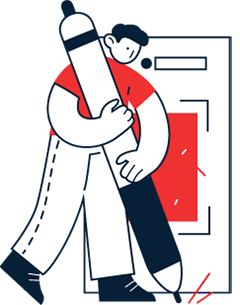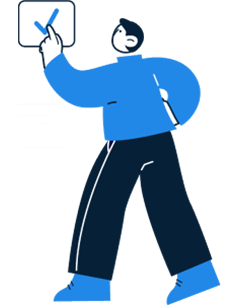
While studying a foreign language, you will master various skills, including vocabulary expansion. Each topic is usually built on an integrated approach: certain grammatical rules are studied along with new and learned vocabulary. If you want to expand your vocabulary, this article will be useful for you.
ome Russian words are known everywhere. You do not need to translate them. Either because the word is simply unrenderable, or because the translation is redundant — this phenomenon is well known.
By clicking "Send" you agree to us processing your information
These words will come in handy in your everyday life at the first stage of learning Russian.
| Word | Pronunciation | Translation |
| Nouns | ||
| Вид | [вит / vit] | A view, appearance |
| Вопрос | [вапро́с / vaprós] | A question |
| Время | [вр’э́м’а / vremya] | The time |
| Глаз | [глас / glas] | An eye |
| Год | [гот / got] | A year |
| Голова | [галава́ / galava] | A head |
| Дело | [д’эла́ / dela] | Business |
| День | [д’эн’ / den’] | A day |
| Дом | [дом / dom] | A house |
| Друг | [друк / druk] | A friend |
| Жизнь | [жызн’ / zhyzn’] | Life |
| Конец | [кан’э́ц / kaǹets] | The end |
| Лицо | [лицо́ / litsó] | A face |
| Место | [м’э́ста / m̀esta] | A place |
| Мир | [мир / mir] | Peace, a world |
| Работа | [рабо́та / rabóta] | Work |
| Раз | [рас / ras] | A time |
| Ребенок | [риб’о́нак / ribyónak] | A child |
| Рука | [рука́ / ruka] | A hand |
| Сила | [си́ла / síla] | A force, strength |
| Слово | [сло́ва / slóva] | A word |
| Случай | [слу́чай / slúchay] | A case |
| Сторона | [старана́ / starana] | A side |
| Страна | [страна́ strana] | A country |
| Человек | [чилав’э́к / chilav̀ek] | A human |
| Verbs | ||
| Быть | [быт’ /byt’] | To be |
| Взять | [вз’ат’ / vzyat’] | To take |
| Видеть | [ви́дит’ / vídit’] | To see |
| Говорить | [гавари́т’ gavarít’] | To speak |
| Дать | [дат’ / dat’] | To give |
| Думать | [ду́мат’ / dúmat’] | To think |
| Жить | [жыт’ zhyt’] | To live |
| Знать | [знат’ znat’] | To know |
| Идти | [ити́ / ití] | To go |
| Иметь | [им’э́т’ / imyet’] | To have |
| Мочь | [моч’ / moch’] | To be able to |
| Оказаться | [аказа́т’с’а / akazat’sya] | To turn out |
| Получить | [палучи́т’ / paluchít’] | To receive |
| Понять | [пан’а́т’ / pfnyat’] | To understand |
| Работать | [рабо́тат’ / rabótat’] | To work |
| Сделать | [сде́лат’ / sdelat’] | To make |
| Сидеть | [сиде́т’ / sidet’] | To sit |
| Сказать | [сказа́т’ / skazat’] | To tell |
| Смотреть | [сматре́т’ / smatr̀et’] | To look |
| Спросить | [спраси́т’ / sprasít’] | To ask |
| Стать | [стат’ / stat’] | To become |
| Хотеть | [хат’э́т’ / hatet’] | To want |
| Adverbs | ||
| Больше | [бо́л’ш’э / ból’she] | More |
| Вдруг | [вдрук / vdruk] | Suddenly |
| Вместе | [вм’э́ст’э vm̀este] | Together |
| Вообще | [вапщ’э́ / vapshch̀e] | At all |
| Еще | [ищ’о́ / ishchyó] | Yet |
| Меньше | [мэ́н’ш’э / m̀en’she] | Less |
| Особенно | [асо́бина / as̀obina] | Specially |
| Очень | [о́ч’ин / óchin’] | Very |
| Почти | [пачти́ / pachtí] | Nearly |
| Снова | [сно́ва / snóva] | Again |
| Совсем | [сафс’э́м / safsỳem] | At all |
| Сразу | [сра́зу / srazu] | Immediately |
| Уже | [уж’э́ / uzh̀e] | Already |
| Хорошо | [харашо́ / harashó] | Well |
| Adjectives | ||
| Белый | [б’э́лый / belyj] | White |
| Большой | [бал’шо́й / bal’shóy] | Large |
| Высокий | [высо́кий / vysókiy] | Tall |
| Главный | [гла́вный / glavnyj] | Main |
| Государственный | [гасуда́рств’эный / gasudarstvinyj] | State |
| Далекий | [дал’о́кий / dalyókiy] | Far |
| Маленький | [ма́л’ин’кий / malin’kiy] | Small |
| Молодой | [маладо́й / maladóy] | Young |
| Настоящий | [настайа́щий / nastayashchiy] | Present, real |
| Новый | [но́вый / nóvyj] | New |
| Нужный | [ну́жный / nýzhnyj] | Needed |
| Общий | [о́бщий / ̀obshchiy] | General |
| Основной | [аснавно́й / asnavnóy] | Main |
| Полный | [по́лный / pólnyj] | Full |
| Последний | [пасл’э́дний / pasl̀edniy] | Last |
| Разный | [ра́зный / raznyj] | Different |
| Российский | [раси́йский / rasíyskiy] | Russian |
| Русский | [ру́ский / rúskiy] | Russian |
| Собственный | [собствиный / sobstvinyj] | Own |
| Старый | [ста́рый / staryj] | Old |
| Хороший | [харо́ший / haróshiy] | Good |
| Черный | [ч’о́рный / chyórnyj] | Black |
| Pronouns | ||
| Все | [фсе / fse] | Everybody |
| Всё | [фс’о / fsyo] | Everything |
| Где | [гд’э / gde] | Where |
| Его | [йиво / yivo] | His |
| Который | [каторый / katoryj] | Which |
| Мы | [мы / my] | We |
| Наш | [наш / nash] | Our |
| Он / она / они | [он / on] | He / she / they |
| Сам | [сам / sam] | Itself (myself, yourself…) |
| Свой | [свой / svoy] | Own |
| Себя | [сиб’а / sibya] | Itself (myself, yourself…) |
| Столько | [стол’ка / stol’ka] | So many/much |
| Такой | [такой / takoy] | Such |
| Ты | [ты / ty] | You |
| Что | [што / shto] | What |
| Это / этот | [эта / eta] | This |
| Я | [йа / ya] | I |
To the above words, you can add the following list of categories which will help you to be more fluent:
However, just learning the words is not enough. You need constant practice to understand how to use them correctly. It is better to practice with other students in a group or with a teacher alone. Sign up for courses in the School of Russian Language “Leader” and soon you will notice progress in learning Russian!
We hope you found this article useful. We are ready to help you learn Russian online with a native speaker. Classes are individually adapted to your wishes. Submit an application for a free trial lesson and we will find the most suitable Russian language course for you.

By clicking "Send", you consent to us processing of your information.





By clicking "Send" you agree to us processing your information
By clicking "Send" you agree to us processing your information